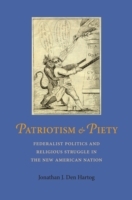Detailansicht
Patriotism and Piety
eBook - Federalist Politics and Religious Struggle in the New American Nation, Jeffersonian America
ISBN/EAN: 9780813936420
Umbreit-Nr.: 3131792
Sprache:
Englisch
Umfang: 278 S.
Format in cm:
Einband:
Keine Angabe
Erschienen am 12.01.2015
Auflage: 1/2015
E-Book
Format: PDF
DRM: Adobe DRM
- Kurztext
- <p><p>In<i>Patriotism and Piety,</i> Jonathan Den Hartog argues that the question of how religion would function in American society was decided in the decades after the Constitution and First Amendment established a legal framework. Den Hartog shows that among the wide array of politicians and public figures struggling to define religions place in the new nation, Federalists stood outevolving religious attitudes were central to Federalism, and the encounter with Federalism strongly shaped American Christianity.</p><p>Den Hartog describes the Federalist appropriations of religion as passing through three stages: a"e;republican"e; phase of easy cooperation inherited from the experience of the American Revolution; a"e;combative"e; phase, forged during the political battles of the 1790s1800s, when the destiny of the republic was hotly contested; and a"e;voluntarist"e; phase that grew in importance after 1800. Faith became more individualistic and issue-oriented as a result of the actions of religious Federalists.</p><p>Religious impulses fueled party activism and informed governance, but the redirection of religious energies into voluntary societies sapped party momentum, and religious differences led to intraparty splits. These developments altered not only the Federalist Party but also the practice and perception of religion in America, as Federalist insights helped to create voluntary, national organizations in which Americans could practice their faith in interdenominational settings.</p><p><i>Patriotism and Piety</i>focuses on the experiences and challenges confronted by a number of Federalists, from well-known leaders such as John Adams, John Jay, Charles Cotesworth Pinckney, and Timothy Dwight to lesser-known but still important figures such as Caleb Strong, Elias Boudinot, and William Jay.</p></p>
